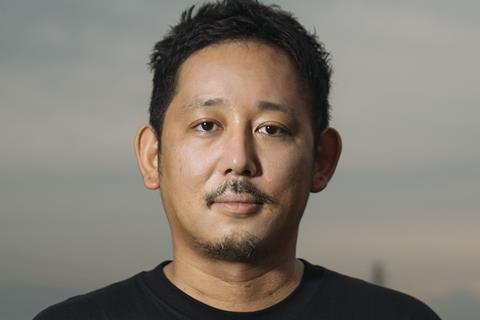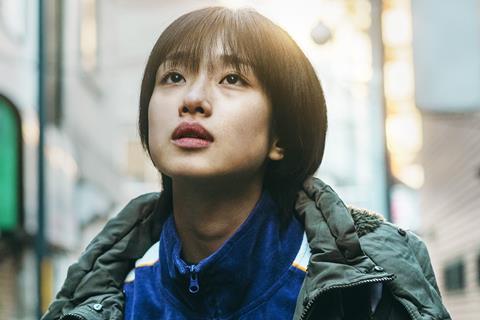
Loss played a large part in the making of A Girl Named Ann by Yu Irie, who is the director in focus at this year’s Tokyo International Film Festival (October 28-November 6).
The Japanese filmmaker broke through in 2009 with his second feature 8000 Miles, centred on a group of down-and-out rappers from rural Saitama. It spawned two sequels while he also branched out into a variety of genres and budgets, from small-scale dramas like Vigilante to mainstream thrillers like AI Amok.
However, the director’s latest is a social drama based on true events, featuring some of his most challenging material to date. A Girl Named Ann stars Yuumi Kawai as a young woman whose efforts to break free from addiction and prostitution are shattered by the pandemic. Produced by Cogitoworks, it was released locally by Kino Films in June.
As part of a focus on the director, TIFF will screen the film as well as 8000 Miles and its sequels 8000 Miles 2: Girls Rapper and Roadside Fugitive, rounding out the selection with his 2016 sci-fi feature The Sun.
Irie, who TIFF programming director Shozo Ichiyama calls “one of the key figures shaping the future of Japanese cinema,” spoke to Screen about his latest feature, making a pandemic film just a few years before the Covid outbreak and what he plans to make next.
A Girl Named Ann is based on a true story. Could you share why you decided to turn this story into a film?
The model for our character Ann managed to escape prostitution and drug addiction and began to go to school, but then died from suicide during the pandemic. I found that story shocking. I wanted to understand what she felt and why she fell into despair. In addition, during the pandemic, I lost two of my good friends, one to sickness and another to suicide. I wanted to understand what that friend was feeling as well. Those were my two motivations for making the film.
You’ve said you didn’t want to write Ann as “someone to be pitied”.
I somehow felt portraying her as a subject of pity would be rude. I made the film to understand her better, so I decided not to push my own interpretations onto her. I knew the basic facts of what had happened to her, but not what she was thinking and feeling. While writing the script, I decided to cast Yuumi Kawai as Ann, and through talks with Kawai, we decided what kind of person Ann might be. One thing Kawai said was that there are aspects of Ann she could really respect, like escaping the cycle of drug addiction and her bad family situation. That took a lot of courage. So both Kawai and I felt that portraying Ann with a level of respect was the right way to go.

You met Yuumi Kawai years ago when she took one of your acting workshops. She’s had a breakout year, from A Girl Named Ann and Desert Of Namibia to the anime Look Back. Did you sense she would be a star back then?
Yes. She has a great deal of sensitivity when it comes to playing a role. She doesn’t impose her own feelings onto a role so much as listen to the soul of the role. She doesn’t play a character, she lets the character play her. When we met, she was only about 19, but she taught me a lot about acting even then.
What inspired you to make 8000 Miles, the story of a group of wannabe rappers set in your hometown of Fukaya, Saitama?
8000 Miles was made at a period where I’d decided to become a film director, but things weren’t going well, and I was thinking it might not work out. The characters in the film are feeling the same thing but about rap. It’s quite autobiographical. I decided that if the film didn’t work, I’d choose another career. I made it with friends without the guarantee of a cinema release or distribution or anything like that. I personally liked rap, and there weren’t many Japanese films about it. I figured since it might be my final film, I might as well make it about something I liked.
The film gained a lot of attention for its long, unbroken takes. What made you decide on that style?
I always admired that kind of filmmaking. I was pretty good at editing, but I’d wanted to try that one-shot, one-scene style, and I realised a self-financed film like this one might be my only chance at it. Also, the actors in the film had no rap experience. If I’d used editing, I could’ve massaged their performances, but I wanted to show them as they really were.
8000 Miles did well, and you followed it up with two film sequels and a TV series. What do you think made it connect with audiences?
No idea! But when the films came out, we used to do guerilla marketing, going to screenings and rapping in person. I think that was fun for the audience.
The Sun was made in 2016 and is about a new type of deadly virus that overruns the world. It must have been odd to see a real pandemic break out just a few years later.
Yes, it was. The film was based on a play by the troupe Ikiume, which does a lot of science fiction. It’s not only about a virus, but also about society becoming bifurcated into haves and have-nots, which also feels quite applicable to what’s happening today.
Your five films being shown at TIFF span different genres but all feature outsiders or underdogs.
Yes, those are the kind of characters I’m interested in. The kind of people who are having trouble just getting through life. Even when I was getting interested in films as a young person, those were the kinds of characters I was attracted to. The first time I got interested in Japanese films was through Desperado Outpost (Dokuritsu gurentai), a film by Kihachi Okamoto. It’s set during World War II, and it’s about a group of outsiders, soldiers who nobody wants. It’s about tough circumstances, but it’s full of positivity. Seeing that film was a formative experience.
Could you share anything about your upcoming film, Muromachi Outsiders?
I’m putting the final touches on it now, and it’s scheduled to be released January 17. It’s a jidaigeki (historical drama) set in the Muromachi period (1336-1573), and it’s about a masterless samurai who goes up against the government. The lead role is played by Yo Oizumi. It’s also a film about outlaws, outsiders. I’ve always liked jidaigeki, and I wanted to portray people who rise up against those in power. Recently Shogun was a big hit, so I hope jidaigeki can make a comeback in Japan.
Any other upcoming projects?
Well, with A Girl Named Ann being shown at TIFF, I think it’s about time for me to start a new script, so I’ve been reading the newspapers and doing some research.
So your next project might be based on something from real life?
I think so. Rather than inventing stories, I think I’m suited to portraying things that are going on in society or with real people, so I’m currently speaking to various journalists and doing some study.
The above has been translated from Japanese and edited for length and clarity
























No comments yet